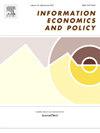The effect of lobbies' narratives on academics' perceptions of scientific publishing: A survey experiment
IF 3.2
3区 经济学
Q1 ECONOMICS
引用次数: 0
Abstract
Biased lobbying narratives shape the perceptions of citizens, practitioners, and policymakers. Copyright lobbies are particularly active today in influencing the Open Access transition. This paper investigates whether opposing copyright lobbies' narratives affect scholars' views on the publishing system. To test the persuasive power of these narratives, we conducted a large-scale randomized survey experiment in six European countries. Scholars were randomly assigned to a control group or exposed to one of two promotional videos representing opposing lobbying interests. The first video presented the publishers' narrative, portraying publishers as innovative firms and guardians of ethics and scientific advancement. The second video presented the narrative of copyright activists, depicting publishers as greedy and unethical. Our findings document scholars' general discontent with the publishing system. However, both lobbying narratives successfully influenced perceptions in favor of their respective causes. Overall, the publishers' narrative had a slightly smaller persuasive effect, largely due to a subset of participants who exhibited strong emotional reactions to the activists' messaging.
说客叙事对学者对科学出版认知的影响:一项调查实验
有偏见的游说叙事塑造了公民、从业人员和政策制定者的看法。如今,版权游说团体在影响开放获取过渡方面尤为活跃。本文考察了反对版权游说团体的叙述是否会影响学者对出版制度的看法。为了测试这些叙述的说服力,我们在六个欧洲国家进行了大规模的随机调查实验。学者们被随机分配到一个对照组,或者观看两个代表对立游说利益的宣传视频中的一个。第一个视频展示了出版商的叙述,将出版商描绘成创新的公司和道德和科学进步的守护者。第二个视频呈现了版权活动家的叙述,将出版商描绘成贪婪和不道德的人。我们的调查结果记录了学者们对出版制度的普遍不满。然而,两种游说叙事都成功地影响了人们对各自事业的看法。总的来说,出版商的叙述的说服力略小,这主要是由于一部分参与者对活动家的信息表现出强烈的情绪反应。
本文章由计算机程序翻译,如有差异,请以英文原文为准。
求助全文
约1分钟内获得全文
求助全文
来源期刊

Information Economics and Policy
ECONOMICS-
CiteScore
5.00
自引率
10.70%
发文量
27
期刊介绍:
IEP is an international journal that aims to publish peer-reviewed policy-oriented research about the production, distribution and use of information, including these subjects: the economics of the telecommunications, mass media, and other information industries, the economics of innovation and intellectual property, the role of information in economic development, and the role of information and information technology in the functioning of markets. The purpose of the journal is to provide an interdisciplinary and international forum for theoretical and empirical research that addresses the needs of other researchers, government, and professionals who are involved in the policy-making process. IEP publishes research papers, short contributions, and surveys.
 求助内容:
求助内容: 应助结果提醒方式:
应助结果提醒方式:


